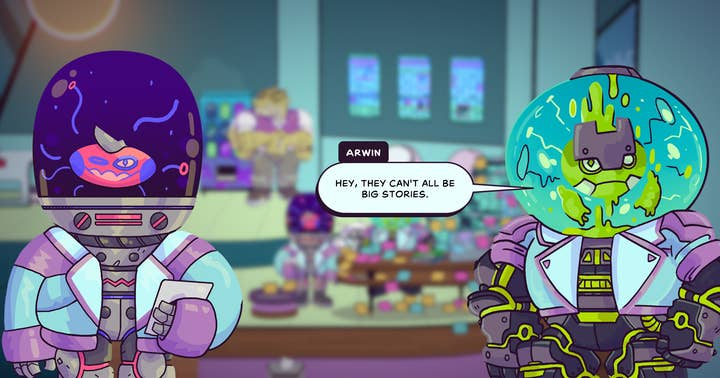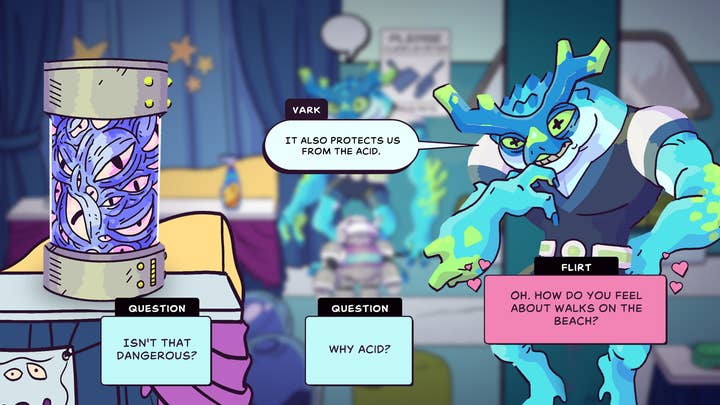Copychaser Games' blueprint for story-focused titles
From Bioware to indies, Ben Gelinas talks narrative development and Times & Galaxy
Sign up for the GI Daily here to get the biggest news straight to your inbox
Writing a good story is challenging; sometimes, humor doesn't land, or a character may not be understood. However, the payoff remains the same; people enjoy an engaging narrative and will return for more.
Speaking with GamesIndustry.biz, Bioware alum and now Copychaser Games' creative director, writer, and producer Ben Gelinas explains the nuances of developing a good story. He also takes us through the company's goals for its new title Times & Galaxy.
The studio was established in 2017, shortly after Gelinas' exit from Bioware. During his five-year stint, he wrote for titles such as Mass Effect 3, Dragon Age: Inquisition, and Mass Effect: Andromeda. Copychaser's first release was Speed Dating for Ghosts in 2018 on Steam, which launched on multiple platforms two years later. The title had a small team that included Gelinas, Mikey Hamm, Andrew Carvalho, and Doug Hoyer.
Regarding how Copychaser Games approaches new narratives, Gelinas says it looks at topics and places in unfamiliar settings. For example, most people associate ghosts with death and haunting. So the idea shifted to placing them in a different context, dating, and Speed Dating for Ghosts was born from that idea.
"More staff and money tend to mean more moving parts and variables"
The new perspective on narrative creation was made easier by leaving AAA game development. He reminds GamesIndustry.biz that video games still have an opportunity to tell more stories, saying, "…we tend to see the same general stories, archetypes, and perspectives repeated--especially in the AAA space.
Gelinas adds that the bigger the project, the more siloed it is for a writer. "More staff and money tend to mean more moving parts and variables. Because of that, the edges occasionally get filed off, story-wise. With indie, I do a lot more development beyond writing. And there are far more limitations regarding what we can do regarding gameplay, audio, and art," Gelinas explains.

Another difference Gelinas mentions with the shift to indie development is size and scope. He was the only full-timer within Copychaser; the other team members were part-timers juggling their roles with other commitments. And on top of game development, the company also outsources services such as writing or art design for other projects.
Copychaser has worked on titles such as Warner Bros. Games' Gotham Knights title and Remedy Entertainment's Control.
"We also work with other indie studios for key technical and art support like Laundry Bear and Sleeping Giant. We have no actual physical studio space; everyone on Times & Galaxy works at home or in coworking spaces in either Edmonton, the Greater Toronto Area, or in the case of our character artist, New Jersey. We're super small but scrappy," he explains.
"Somehow, those limitations lead to something more bespoke and, in the case of Copychaser, weird. I crave that smaller box to play in, knowing the limits but giving myself enough room to fill it to its full capacity/potential."
Gelinas and the studio are practicing those lessons with the new journalism-themed Times & Galaxy. The title's inspirations came from fans, Gelinas' background in journalism, and interest in science fiction. As a larger title, its creative team includes more writers such as Sunny Evans, Paul Blinov, and Tess Degenstein.
Gelinas says Copychaser's overall approach to storytelling development is "to create unique, inclusive video games with branching narratives and memorable characters. Every Copychaser game puts the player at the center of an eccentric and immersive story unlike any they've ever played.
"With Times & Galaxy, we started from a similar place: local newspaper journalism in an absurd science fiction setting. From artists to audio to programming, we all first need to buy into the tone of this game."
"I encourage everyone on the team never to say no, that's too far to themselves"
He continues, "…I encourage everyone on the team never to say 'No, that's too far' to themselves. It's their job to push, and it's my job to tell them when they've pushed too far. Although sometimes, when I get too excited about a bad idea, those roles reverse.
"Players asked that they could play a game with a cast of reactive and deep characters, in a setting with super-detailed lore, but without a story that required them to kill stuff every ten minutes."
The title's focus on journalism was inspired by Gelinas' previous career as a local crime reporter. He says that he met many kinds of people on the beat and told many types of stories. Combining those experiences with the interactivity of video games was an exciting prospect as a developer.
Gelinas explains, "I also didn't want to go too dark and too real with the themes. I thought that would be less accessible to a lot of players. So instead, I wanted to make a science fiction game. So reporting became the reason for players to explore a unique, absurd setting, rather than the whole point."

Copychaser decided to use a robot because the concept of another sci-fi game with a human or alien lead would've been dull. So instead, he wanted humans to be as strange as different humanoid species.
"Robots are also a staple of sci-fi. They offer a fresh, but still in some ways familiar, perspective for players"
"Robots are also a staple of sci-fi. They offer a fresh, but still in some ways familiar, perspective for players. Plus, it's about time robots get to be the heroes. There are so many iconic robot characters, but how many of them get to be anything but sidekicks or grunts," he says.
"Robots in our game setting are still pigeonholed into positions of manual and menial tasks. As a result, they haven't been able to be the main characters of their stories either. Until your robot comes off the assembly line."
Playing as an intern was also a game design decision to help users get familiar with journalism. Becoming a reporter is a part of the overall narrative and the main character's personal story.
Gelinas adds that the Copychaser team wants to create more episodic stories based on actual events with a sci-fi angle. "Our game has stories about a toy that explodes when you play with it too much; an interplanetary model United Nations that devolves into a Lord of the Flies situation; a robot fight event where the robots are sentient and an alien graduation," he says.
"We dove into this game thinking, 'Why the hell not?' and buckets of stories I've never seen in a game were the result."
Despite the novel stories in the game, players may still be familiar with the developers' numerous influences.
"Times & Galaxy might be a game for Star Trek fans," Gelinas says. "On the other hand, it might be a game for readers of Douglas Adams and Terry Pratchett, with all their genre-loving absurdity.
Still, there's a balancing act in maintaining user interest and having too much exposition in a story. Gelinas says that the more a setting and its characters are established, the easier it is to create an experience within that setting.
Fellow Traveler is currently partnered with Copychaser to help it publish Times & Galaxy.
In terms of their assistance, Gelinas says, "They feel like a partner and co-conspirator in our weird vision. What they don't do is try to water down our vision. Instead, they work hard to understand what we are trying to do and then help us find the biggest and best audience for our weird idea."
"The goal has always been to make focused, lower budget narrative experiences that don't yet exist"
For Gelinas and the Copychaser team, Times & Galaxy is the most ambitious game they've made. However, the studio's intention remains the same. He says, "The goal of Copychaser has always been to make focused, lower budget narrative experiences that don't yet exist – and we want to keep making those kinds of games."
He explains that if the new title reaches a degree of commercial success, all Copychaser team members can work on its next project in full-time roles.
Gelinas says, "For Times & Galaxy, we were fortunate enough to receive Canada Media Fund support as well as support from our publisher Fellow Traveller, so we want to sell enough to make their contributions worthwhile."
"When we developed our budget and production plan, we aimed to make this game for as little money as it would take –low-budget horror movie style– so breaking even is not such a tall hill to climb, and everything else is icing… on the hill."
When asked how developers could pitch narrative games to players, he explained that it's a fine line to tow.
"Story is a compelling reason for the player to play and to keep playing. Games have always had stories. Completing a challenge is a story."
"But tech and a growing ability to reach niche audiences online have only helped developers push game narratives in new directions. As an industry, we are still scratching the surface of what interactive narrative can do. So it's exciting to imagine where game stories will take us even in the next few years."
Sign up for the GI Daily here to get the biggest news straight to your inbox

